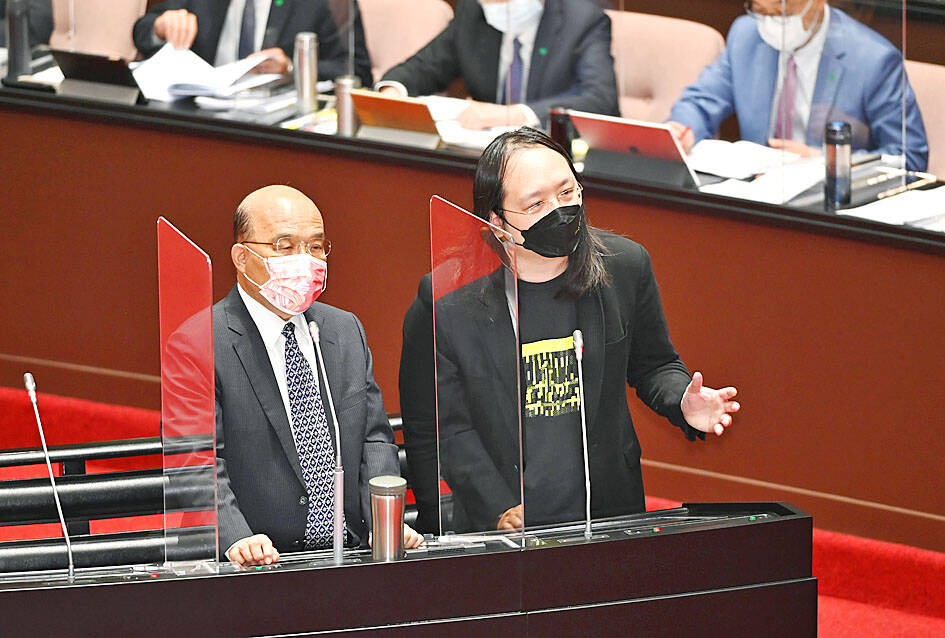Taiwan should step up efforts to prevent hackers and cyberattacks through cultivation of a “red team” of testers, Minister of Digital Development Audrey Tang (唐鳳) said at the legislature in Taipei yesterday.
During US House of Representatives Speaker Nancy Pelosi’s visit to Taipei in August, many government agencies and private Web sites reported distributed denial of service (DDoS) attacks, while many convenience stores and infrastructure elements were hacked.
Saying that Taiwanese abhor cybercrime, independent Legislator Huang Kuo-shu (黃國書) asked the ministry whether it is confident about ensuring the nation’s information security.

Photo: Tien Yu-hua, Taipei Times
Tang said that when the attacks were reported during Pelosi’s visit, the government distributed the data on the systems that had been attacked to other computers with novel content dissemination technologies to counter the attacks.
Departments in charge and system integrators learned from the experience how to rebuild the system using advanced technologies to protect them from further attacks, she said.
“Learning from the attacks is called tenacity,” she added.
Asked whether the ministry would proactively investigate and seize problematic information security products purchased from China by government agencies and the private sector, Tang said that it is a usual task carried out by the ministry and promised to focus more on preventing potential attacks.
Taiwan should develop its own “red team power” by ordering start-ups and information security companies to conduct regular health checks of their information security mechanisms, she said.
By “red team power,” she referred to the term “red team assessment” in information security — carrying out simulated attacks on businesses to test the security of their systems.
Random attacks would be launched at certain business targets during a designated period to test for information security loopholes and help businesses better protect their systems, she said.

Conflict with Taiwan could leave China with “massive economic disruption, catastrophic military losses, significant social unrest, and devastating sanctions,” a US think tank said in a report released on Monday. The German Marshall Fund released a report titled If China Attacks Taiwan: The Consequences for China of “Minor Conflict” and “Major War” Scenarios. The report details the “massive” economic, military, social and international costs to China in the event of a minor conflict or major war with Taiwan, estimating that the Chinese People’s Liberation Army (PLA) could sustain losses of more than half of its active-duty ground forces, including 100,000 troops. Understanding Chinese

The Ministry of Foreign Affairs (MOFA) yesterday said it is closely monitoring developments in Venezuela, and would continue to cooperate with democratic allies and work together for regional and global security, stability, and prosperity. The remarks came after the US on Saturday launched a series of airstrikes in Venezuela and kidnapped Venezuelan President Nicolas Maduro, who was later flown to New York along with his wife. The pair face US charges related to drug trafficking and alleged cooperation with gangs designated as terrorist organizations. Maduro has denied the allegations. The ministry said that it is closely monitoring the political and economic situation

UNRELENTING: China attempted cyberattacks on Taiwan’s critical infrastructure 2.63 million times per day last year, up from 1.23 million in 2023, the NSB said China’s cyberarmy has long engaged in cyberattacks against Taiwan’s critical infrastructure, employing diverse and evolving tactics, the National Security Bureau (NSB) said yesterday, adding that cyberattacks on critical energy infrastructure last year increased 10-fold compared with the previous year. The NSB yesterday released a report titled Analysis on China’s Cyber Threats to Taiwan’s Critical Infrastructure in 2025, outlining the number of cyberattacks, major tactics and hacker groups. Taiwan’s national intelligence community identified a large number of cybersecurity incidents last year, the bureau said in a statement. China’s cyberarmy last year launched an average of 2.63 million intrusion attempts per day targeting Taiwan’s critical

‘SLICING METHOD’: In the event of a blockade, the China Coast Guard would intercept Taiwanese ships while its navy would seek to deter foreign intervention China’s military drills around Taiwan this week signaled potential strategies to cut the nation off from energy supplies and foreign military assistance, a US think tank report said. The Chinese People’s Liberation Army (PLA) conducted what it called “Justice Mission 2025” exercises from Monday to Tuesday in five maritime zones and airspace around Taiwan, calling them a warning to “Taiwanese independence” forces. In a report released on Wednesday, the Institute for the Study of War said the exercises effectively simulated blocking shipping routes to major port cities, including Kaohsiung, Keelung and Hualien. Taiwan would be highly vulnerable under such a blockade, because it